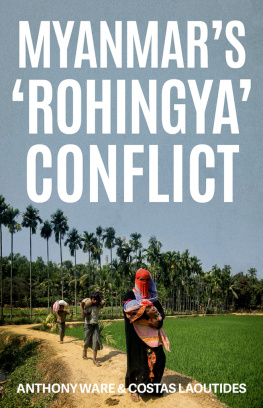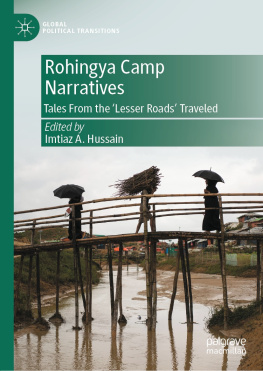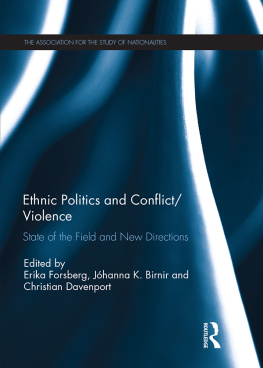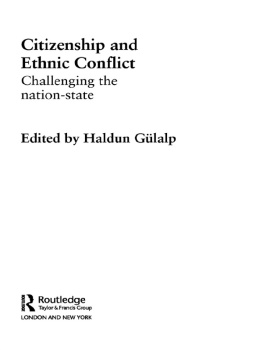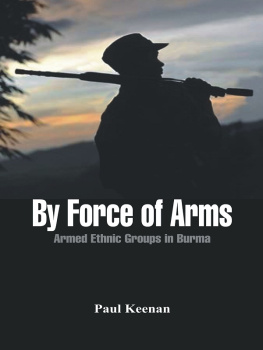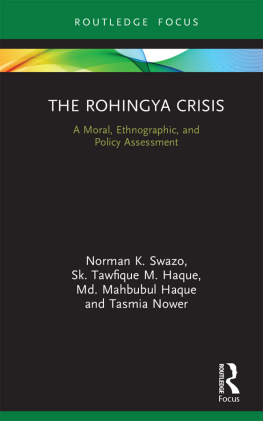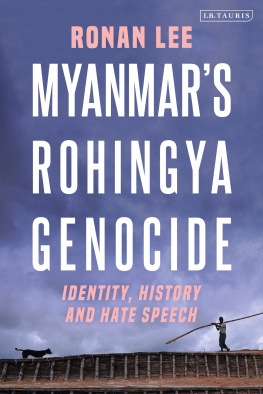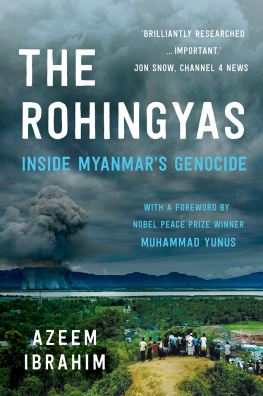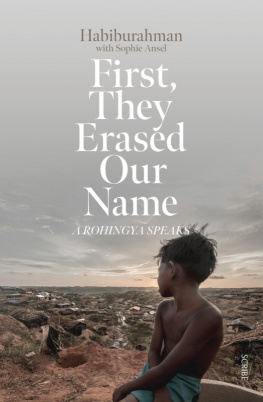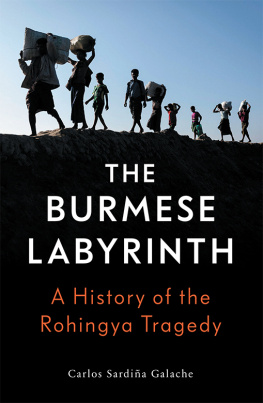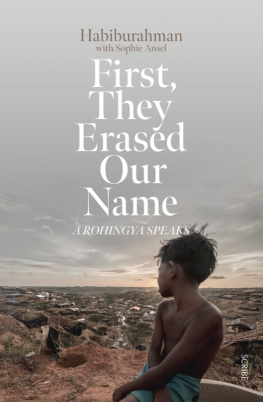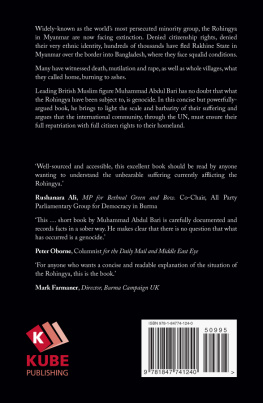MYANMARS ROHINGYA CONFLICT
ANTHONY WARE
COSTAS LAOUTIDES
Myanmars
Rohingya Conflict


Oxford University Press is a department of the University of Oxford. It furthers the Universitys objective of excellence in research, scholarship, and education by publishing worldwide.
Oxford New York Auckland Cape Town Dar es Salaam Hong Kong Karachi Kuala Lumpur Madrid Melbourne Mexico City Nairobi New Delhi Shanghai Taipei Toronto
With offices in Argentina Austria Brazil Chile Czech Republic France Greece Guatemala Hungary Italy Japan Poland Portugal Singapore South Korea Switzerland Thailand Turkey Ukraine Vietnam
Oxford is a registered trade mark of Oxford University Press in the UK and certain other countries.
Published in the United States of America by
Oxford University Press
198 Madison Avenue, New York, NY 10016
Copyright Anthony Ware and Costas Laoutides 2018
All rights reserved. No part of this publication may be reproduced, stored in a retrieval system, or transmitted, in any form or by any means, without the prior permission in writing of Oxford University Press, or as expressly permitted by law, by license, or under terms agreed with the appropriate reproduction rights organization. Inquiries concerning reproduction outside the scope of the above should be sent to the Rights Department, Oxford University Press, at the address above.
You must not circulate this work in any other form and you must impose this same condition on any acquirer.
Library of Congress Cataloging-in-Publication Data is available
Anthony Ware and Costas Laoutides.
Myanmars Rohingya Conflict.
EISBN: 9780190050313
CONTENTS
HISTORICAL NARRATIVES, REPRESENTATION,
AND COLLECTIVE MEMORY
Maps
Figures
Tables
We would like to express our sincere gratitude to a large number of people who have supported and aided us in this work. In particular, we would like to start by thanking our many informants, Rohingya, Rakhine, Burman, Hindu, and international, and from civil society, political parties, the bureaucracy, the military, academia, and the diplomatic service. Thank you for your generosity, sharing time and perspectives. Some of you were hesitant to speak about such a difficult topic as this. We appreciate your deep concerns, given that it is such an explosive issue inside Myanmar, and that it is extremely personal to many of you. We appreciate that wrong words, or something taken out of context, may have serious consequences for individuals, communities, careers, international relations, the government, or the economy. We may not always agree, but we deeply appreciate your time sharing your perspective with us. Thank you for taking the risk and speaking with us. Thank you too, to our many friends in Myanmar, on all sides of this conflict, for the many informal conversations over the past few years. The analysis of ideas and concepts in this work are our own, and we apologize in advance to anyone who is disappointed, even upset, with any of our comments, use of language, analysis, or conclusions. We have tried to faithfully reflect your voices in our text first, even if we then go on to critique and disagree. A special thank you to those who have read and provided feedback on drafts or sections of this work, especially the two anonymous reviewers arranged by the publishers, and Martin Smith, Dr Jacques Leider, Dr Peter Thein Nyunt, and Dr Vicki-Ann Ware. Thank you for your comments, which have helped us greatly in correcting and refining the text. Any mistakes, errors, omissions, or misunderstandings in the book are ours alone, but we are very grateful for your help in spotting issues along the way. Thank you to our two local NGO partners, who have provided us deep insights into local ethnic Rakhine, minorities and sometimes Muslim perspectives: the Sittwe-based Community Development Education, and the Socio-Economic Development Institute. Thank you in particular to Kyaw Soe and Soe Lunn. Thank you to Christopher Lamb, the board and members of the Australia Myanmar Institute, for brokering contacts and helping us gain access to various officials and key contacts. Thank you likewise to Ronan Lee and David Mathieson for offering numerous contacts. Thank you to the Gerda Henkel Foundation, for providing a research grant for our work (AZ 12/KF/16). This is only the beginning of the findings and results of your funding. Thank you likewise to GraceWorks Myanmar for grant funding to explore the conflict dynamics in Rakhine State, in order to provide strategic advice on conflict-sensitive development approaches in parts of that state. Thank you to the Alfred Deakin Institute, for research funding which got us started on this project and for the strongly supportive research environment they provided along the way. A huge thank you to Jon de Peyer and Michael Dwyer at Hurst Publishers, who believed in us and have shown great patience and forbearance in the preparation of this manuscript. And finally, thank you to our wives and families for putting up with weeks and weeks apart, our evenings, weekends, and holidays glued to a computer screen, and endless conversations about this material. Thank you.
Myanmar will confound and frustrate even its most ardent admirers and supporters. After decades as one of the worlds leading liberal causes, Myanmars evolution in recent years from an opaque, repressive state to a more open and reform-minded nascent democracy became one of the eras few good news stories.
The world looked on with awe and delight as thousands of political prisoners rejoined their families, the media and civil society were substantially liberalized, and serious peace talks were undertaken to end Myanmars decades-long civil war. Myanmars people even had their inked finger moment in November 2015, when they took part in the countrys first credible and representative national election since 1990. A landslide victory for the opposition National League for Democracy party led to the ascension of democracy icon Aung San Suu Kyi to (civilian) leadership. Hope reigned supreme as fifty years of military domination appeared to succumbfinallyto people power.
Those who were watching the country up close, however, understood the limitations of that euphoric moment. An election cannot make a half-century of institutional degradation and underdevelopment disappear overnight. Fear, mistrust, and insecurity remained pervasive throughout the country. Military violence continued to rage, particularly in the north in Kachin State and in northern Shan State. A deeply flawed constitution remained unamended.
And those of us on the ground recognized the ticking time bomb that existed in northern Rakhine State.
Amidst the many positive developments in Myanmar since 2011, deteriorating conditions in Rakhine State stood out in stark relief. Eruption of communal violence in June 2012 occurred just a month before I arrived in Yangon as the first US ambassador to the country in twenty-two years, and about nine months after I began serving as US special envoy. My task as envoy had been to test whether principled engagement, not just isolation and sanctions, may serve as a lever for democratic reform in Myanmar. The Rohingya question had always been on the agenda, but its unique complexity and sensitivity amidst so many other priorities required that it be of lesser immediate concern.

